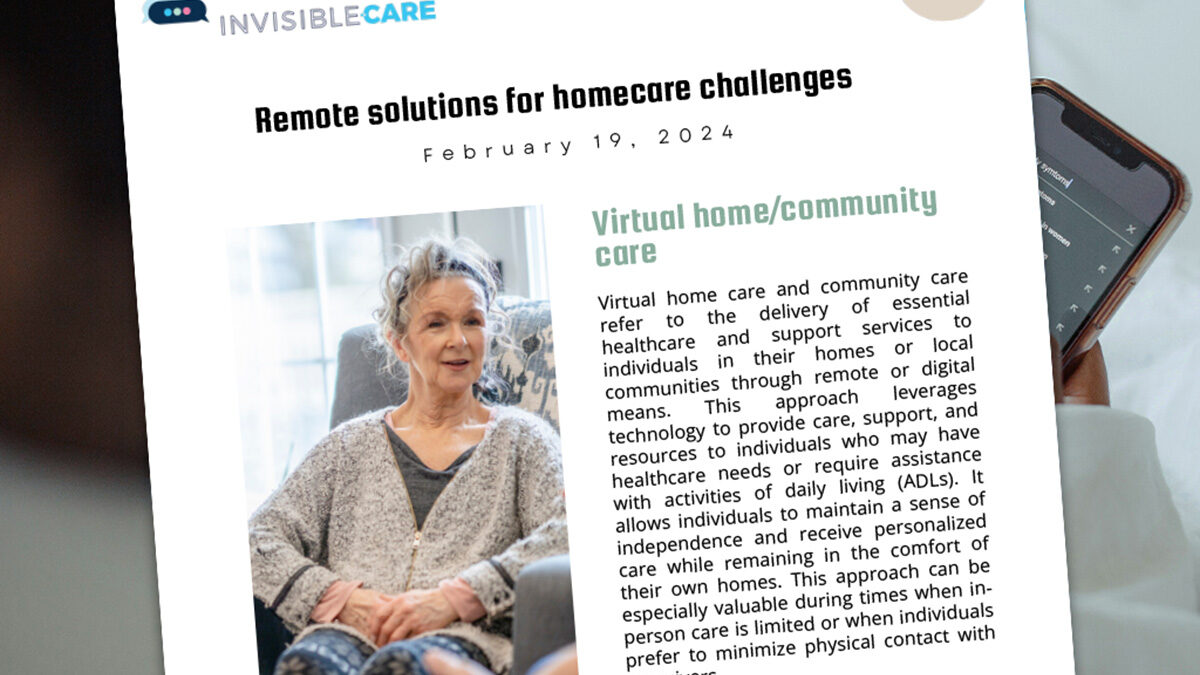
Advantages of Remote Cueing and Prompting
February 5, 2024
What is an Occupational Therapy Situational Assessment?
March 4, 2024
Virtual home/Community Care
Virtual home care and community care refer to the delivery of essential healthcare and support services to individuals in their homes or local communities through remote or digital means. This approach leverages technology to provide care, support, and resources to individuals who may have healthcare needs or require assistance with activities of daily living (ADLs). It allows individuals to maintain a sense of independence and receive personalized care while remaining in the comfort of their own homes. This approach can be especially valuable during times when inperson care is limited or when individuals prefer to minimize physical contact with caregivers.
Both virtual home care and virtual community care are flexible approaches that adapt to individual needs and preferences. They are especially useful when in-person interactions are limited due to factors such as geographical distance, public health concerns, or the desire to receive care and support in the comfort of one’s home or community. These approaches enhance access to healthcare services, support well-being, and empower individuals to take an active role in their health and care.


Ontario Homecare Challenges
In Ontario, as in many other regions, homecare has been a critical aspect of healthcare services, particularly for individuals who require assistance with daily activities due to aging, disabilities, or medical conditions. Here are some of the challenges that have been associated with the homecare situation in Ontario:
- Aging Population: Ontario, like many other parts of the world, has been experiencing an aging population. As the population ages, the demand for homecare services has been increasing, putting pressure on the healthcare system.
- Caregiver Shortages: There have been reports of shortages in trained and qualified caregivers, leading to challenges in providing adequate care to those who need it. The demand for homecare services has at times exceeded the available workforce.
- Waitlists: In some cases, individuals have experienced long waitlists to access homecare services. This can delay much-needed assistance and support for vulnerable individuals.
- Funding and Resources: Adequate funding and resources are essential to ensure the quality and availability of homecare services. Budget constraints and resource allocation have been topics of concern in Ontario’s healthcare system.
- Complex Medical Needs: Many individuals requiring homecare have complex medical needs that require specialized training for caregivers. Providing appropriate care for these cases can be challenging.
- Integration with Healthcare System: Coordinating homecare services with other parts of the healthcare system, such as hospitals and primary care providers, can be complex and requires effective communication and collaboration.

More Ontario Homecare Challenges
- Changing Regulations and Policies: Changes in regulations and policies can impact the delivery of homecare services. It’s important for the healthcare system to adapt to these changes effectively.
- Equity and Accessibility: Ensuring that homecare services are accessible and equitable for all individuals, regardless of their location or socioeconomic status, is a significant challenge.
- Quality Control: Maintaining consistent quality of care across different caregivers and providers is crucial to ensure the well-being of care recipients.
- Impact of COVID-19: The COVID-19 pandemic has introduced additional challenges to the healthcare system, including homecare. Safety protocols, protective equipment, and infection control measures have become essential considerations.
To address these challenges, efforts have been made by government agencies, healthcare organizations, and advocacy groups to improve the homecare situation in Ontario. These efforts might include workforce training and development, increased funding, policy changes, and innovations in service delivery, including remote virtual care solutions. Invisible-Care is one such solution that is looking to make homecare, community care, attendant care, and rehab support more accessible, affordable, and meaningful.





